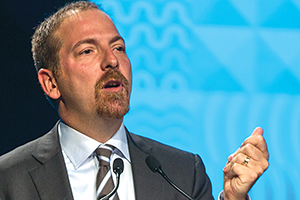By NANCY FRAZIER O'BRIEN
WASHINGTON, D.C. — Voters' "economic anxiety," foreign policy issues and the "broken political system" in the U.S. will be key challenges affecting the outcome of the 2016 presidential campaign, political analyst Chuck Todd told participants in the Catholic Health Assembly here.
Todd, NBC News' political director since 2007 and moderator and managing editor of "Meet the Press" since 2014, made a keynote presentation on "Covering Campaigns, Candidates and Everything in Between" June 8 at the Washington Marriott Wardman Park.

Chuck Todd
Photo credit: Evelyn Hockstein/© CHA
"I don't see any candidate that really wants to change Washington," Todd said. "And voters are protesting by staying away from the polls."
Although voter turnout had seen a "steady increase" since independent candidate Ross Perot mobilized a portion of the electorate in 1992, "something stopped this increase" in the past decade, leading to record low turnouts in 2008 and 2010, he said.
At the same time, presidential campaign spending has increased exponentially, Todd said. He noted that President George W. Bush and his opponent Al Gore spent a fraction on their presidential races in 2000 compared with the $2.5 billion spent in the 2012 election cycle when President Barack Obama defeated Mitt Romney.
"Only college tuition has gone up that much" in the past 12 years, Todd joked.
The economic recovery from the deep recession that began in December 2007 has been slow and uneven, and gains have been concentrated among a fraction of the country's wealthiest families, Todd said. Although there are pockets of economic recovery, especially on the East and West Coasts, some in the middle of the country are "still waiting for recovery," he said.
"The great challenge for the next president is how to respond to this, how to make the country feel that they are turning the corner," Todd added.
In the international policy arena, it is no longer as "easy to sort the world" as it was during the Cold War, he said. Instead U.S. leaders have to seek out "a balance of stability versus democracy" and when they choose to promote democracy, "sometimes we're not going to like the choice" other countries make, Todd said.
He called the current U.S. electoral process "a recipe for gridlock" because it depends on getting a high turnout from voters who are strongly committed to causes that do not interest the majority of voters. Such issues might include reproductive rights and gun control, he said.
Todd also decried the rise in the power of special-interest lobbyists in Washington, who numbered 13,500 in 2009 compared to 175 registered lobbyists in 1975. He said the Affordable Care Act was written "to avoid the wrath of one or two special-interest groups," namely the insurance and pharmaceutical industries.
"All legislation is written this way now," he added.
Todd ended on an optimistic note, saying the millennial generation has commonalities with the "Greatest Generation" that fought in World War I — attributes like entrepreneurial proclivities and a readiness to contribute to the greater community — that could make the generation a "disruptive force" that brings about change in the U.S. political system.
In a brief question-and-answer session, Todd said he did not think health care reform would be a major issue in the 2016 presidential race unless the upcoming Supreme Court decision on federal subsidies in health insurance marketplaces results in a "massive upheaval" of the U.S. health care system.
"People who care about health care ... have already picked their side" in the political arena, he said.
Todd named U.S. Sen. Marco Rubio of Florida as the Republican candidate who has the best chance of beating Democratic candidate Hillary Clinton, but only if Rubio can survive "the tough, tough gauntlet" of media scrutiny over the next year and possible moves against him by other Republican candidates working together.
Copyright © 2015 by the Catholic Health Association
of the United States
For reprint permission, contact Betty Crosby or call (314) 253-3477.